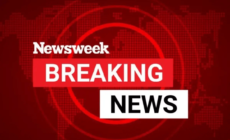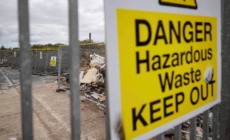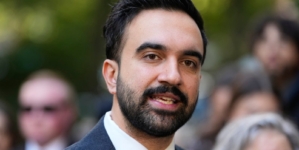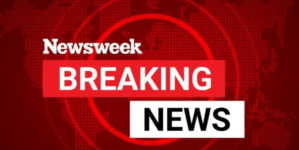-
Report asks why LAPD mental health specialists defer to armed officers - 7 mins ago
-
Israeli Strikes in Gaza Kill at Least 100, Local Health Officials Say - 21 mins ago
-
Zohran Mamdani delivers warning to Donald Trump - 31 mins ago
-
ICE officials in major cities replaced with Border Patrol - 51 mins ago
-
Shop the Detroit Lions lululemon Collection: NFL’s New Premium Team Gear - about 1 hour ago
-
‘Not Very Much Survives a Category 5,’ and the Use of Tear Gas in Chicago - about 1 hour ago
-
Reputed Aryan Brotherhood leader stabbed to death in state prison - 2 hours ago
-
Trump Gives Update on Crunch Xi Meeting: ‘Very Important to World’ - 2 hours ago
-
When Caregiving Makes Women Ill - 2 hours ago
-
New EPA rule could allow more use of toxic chemicals - 2 hours ago
China Issues Statement on Nuclear Weapons
China’s Foreign Ministry has reiterated that the country remains committed to a self-defense-oriented nuclear policy, as Beijing certified two new nuclear test monitoring stations.
Robert Floyd, executive secretary of the Comprehensive Nuclear-Test-Ban Treaty Organization (CTBTO) Preparatory Commission, visited China last week at Beijing’s invitation for the launch ceremony marking the certification of two auxiliary seismic facilities in Shanghai and Xi’an.
Why It Matters
Next year will mark the 30th anniversary of the Comprehensive Nuclear-Test-Ban Treaty, which bans all nuclear explosions.
Both China and the United States are among those that have signed but not ratified the agreement. Still, both countries have adhered to its principles, with neither known to have conducted a full-scale nuclear weapons test since the CTBT’s signing in 1996. Each hosts at least a dozen CTBTO-certified monitoring facilities on their soil as part of the organization’s global verification network.
Newsweek reached out to the CTBTO by email with a request for comment.
What To Know
“In recent years, China and the [CTBTO Provisional Technical Secretariat] have achieved significant cooperation outcomes in areas such as promoting the certification and acceptance of monitoring stations and enhancing capacity building for developing countries,” Chinese Foreign Ministry spokesperson Guo Jiakun said on Monday during a regular press briefing.
“This demonstrates China’s consistent stance of earnestly fulfilling its international obligations and firmly supporting the Treaty,” he added.
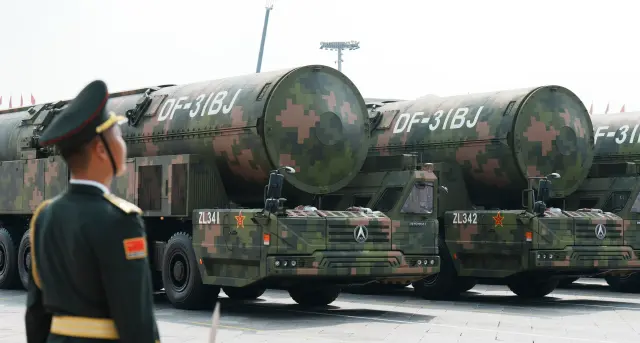
Guo said China, as a “responsible nuclear-weapon state” and a permanent member of the United Nations Security Council, has maintained its long-standing nuclear test moratorium and upheld its no-first-use policy on nuclear strikes.
China is one of only two nuclear-armed nations—alongside India—to officially pledge not to use nuclear weapons first. New Delhi, however, allows for exceptions in the case of nuclear-armed adversaries or states aligned with them.
Beijing has proposed that all five recognized nuclear-weapon states—China, the United States, Russia, France, and the United Kingdom—enter negotiations on a “mutual no-first-use” treaty.
While China’s nuclear stockpile remains far smaller than those of Russia and the U.S., it has expanded rapidly in recent years, modernizing its missile forces and delivery systems to establish a “nuclear triad”—capabilities for land-, sea-, and air-based strategic deterrence.
China’s arsenal reached an estimated 600 warheads in 2024, a roughly 20 percent increase from the previous year, according to assessments by the U.S. Department of Defense and the Stockholm International Peace Research Institute.
A July report by the Washington-based Hudson Institute argued that Beijing’s nuclear buildup is less about preparing for a nuclear exchange and more about deterring the U.S. and its allies from threatening China’s strategic objectives in its region.
What People Are Saying
Floyd said in a video posted to X on Saturday: “The highlight of being in China this week has been the launch of the certification of two auxiliary seismic stations over the next short period of time. Seeing the Chinese government working together, powerfully […] The international monitoring system, for global good, for global peace and security. Multilateralism delivering.”
What Happens Next
The CTBT is unlikely to enter into force anytime soon, as a number of key states—including those with nuclear weapons or the technical potential to develop them—have not signed or ratified it.
Meanwhile, the 2011 New START Treaty, the last remaining nuclear arms reduction pact between Washington and Moscow, is set to expire in February. Russian President Vladimir Putin, who suspended Moscow’s participation in the accord in 2023, has said he remains open to informally maintaining those limits beyond the treaty’s expiration. Washington has not yet responded to the proposal.
Source link






